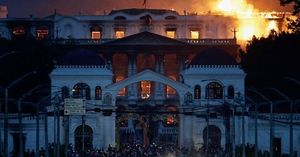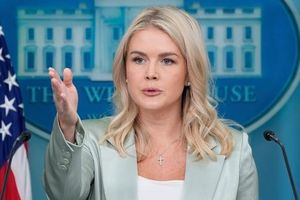Russia’s war against Ukraine has not only wreaked havoc on the battlefield but is also inflicting severe economic strain on its own homeland. Nearly three years since the onset of full-scale conflict, the repercussions of Western sanctions are becoming alarmingly evident, leading to tension among the Kremlin’s power players. The economic situation appears more dire than ever, as the country faces rampant inflation, soaring interest rates, and creeping corporate bankruptcies.
Initially hailed as resilient, the Russian economy is now gripped by tumult. Inflation, officially pegged at 9%, is becoming increasingly problematic, with real interest rates climbing as high as 12%. Just recently, the Central Bank of Russia elevated its key interest rate from 19% to 21% to combat inflationary pressures. The bank’s statement underscored the pressing nature of the issue, indicating demand growth is outstripping the economy’s ability to supply goods and services.
Commentators note how these drastic interest rate hikes may end up being detrimental, rather than beneficial. A group of significant business figures, traditionally aligned with President Vladimir Putin, has begun openly critiquing Elvira Nabiullina, the central bank governor since 2013. Notably, Oleg Deripaska and Alexei Mordashov have lent their voices to the dissent, questioning the sustainability of Nabiullina’s strategy. Mordashov remarked, “We are coming to a situation where the medicine may become more dangerous than the disease.”
What makes this outcry unique is its emergence from within the usually silent ranks of the Russian elite. Chemezov, CEO of the state-owned defense technology conglomerate Rostec, recently expressed serious concerns, claiming, “If we keep operating like this, most of our businesses will go bankrupt.” His warning speaks volumes about the precarious situation businesses find themselves due to high borrowing costs and unsustainable debt levels.
Russian companies have increasingly relied on loans linked to the Central Bank's rate, with floating-rate loans now comprising 53% of corporate borrowing. Before the war, this figure stood at about 20%. Businesses borrowed heavily to fuel growth and adapt to sanctions, but aggressive monetary tightening has ensnared many of them in a perilous debt spiral. Their interest payments are now consuming about 25% of their revenues.
Across various sectors — from retail to manufacturing and construction — signs of distress are mounting. The Russian Union of Industrialists and Entrepreneurs reported significant increases in complaints about late payments, reflecting broader issues within the corporate world. Current conditions threaten immense economic fallout, and companies are left scrambling to manage mounting debts.
For those companies resisting bankruptcy, finding respite has become elusive. The retail sector faces potentially disastrous consequences, with experts warning about the impending collapse of shopping centers due to high interest rates and lost customer revenue. The sector has formally petitioned the government for intervention, including the implementation of subsidized interest rates, debt restructuring, and extended payment deferrals as lifelines.
The construction industry finds itself doubly impacted. With the end of previous mortgage symposiums earlier this year, the cost of borrowing for homeowners has surged, leading to halved mortgage applications. This slowdown could trigger cascading effects across the entire economy, resulting from reduced consumer spending and investment.
Adding to the already bleak picture, Russian bond markets are also on edge. The surge in interest rates is forcing companies to offer staggering yields to attract wary investors. The net debt to EBITDA ratios are alarmingly high, creating insurmountable challenges for corporate entities already struggling to keep above water.
Notably, Munoz's remarks on the bond markets serve as grim reminders of how corporate solvency is being jeopardized. With many firms needing to prioritize repayments over new expansions or investments, the threat of immediate bankruptcy looms large. The pressure is such, according to various reports, companies are already funneling up to three-quarters of their income purely on servicing debts.
Indeed, the economic turmoil is intricately linked to the war. The sanctions imposed by Western nations aimed at crippling Russia’s economic capability continue to have severe repercussions. Gazprom, once the jewel of Russia’s economy, has suffered significantly, with sanctions transforming profits to losses, thereby marking the fall of the oligarchs who had thrived on the company's performance.
Putin’s support for military action has caused the government to focus intensively on military expenditures, pushing aside economic stability. This shift has resulted in rampant inflation exacerbated by increased government spending, compelling the Central Bank to take drastic actions.
Private economists have pointed out the exodus of independent experts from Russia, leaving Russia’s economic discourse to be dominated by loyalists to Putin who lack the requisite qualifications to shape effective policy responses. The confidence around the Central Bank, traditionally regarded as a bastion of stability, is faltering against this backdrop of galloping inflation, deteriorated business conditions, and plummeting foreign investments.
With the economic outlook showing no signs of recovery amid continued hostilities, many around the world wonder when and how this tumultuous chapter for both Russia and Ukraine will come to its conclusion. The consensus among analysts is clear: Without resolving the war and lifting sanctions, Russia's economy will remain shackled by these burdens, leading to dire consequences for countless businesses and ordinary citizens alike.
Analysts predict bankruptcies will only escalate, particularly as companies face immediate debt repayments coinciding with the government’s increasing rigidity concerning lending and spending. The outlook remains bleak, as Russia's financial systems continue to grapple with the ramifications of this multi-faceted crisis.



